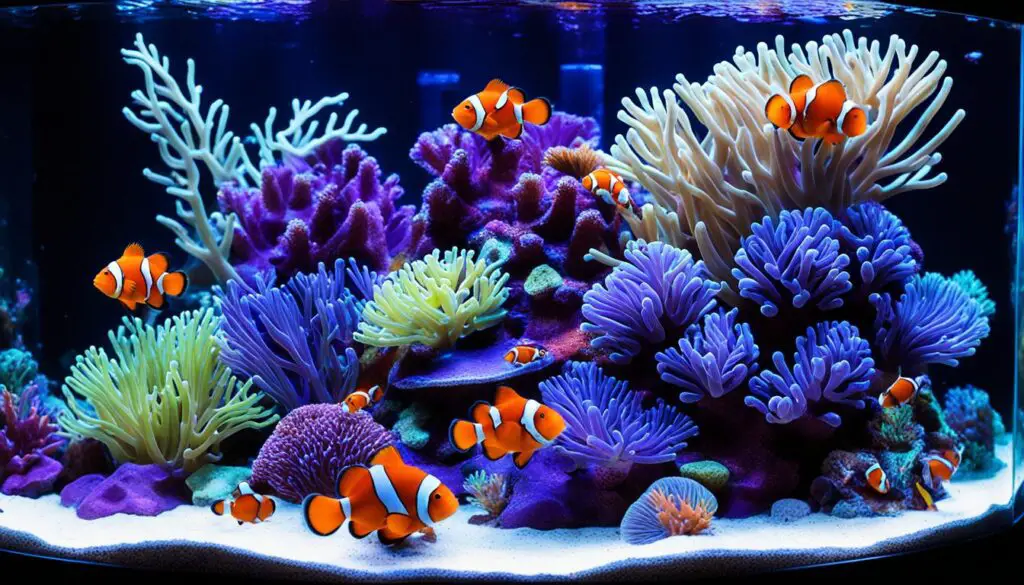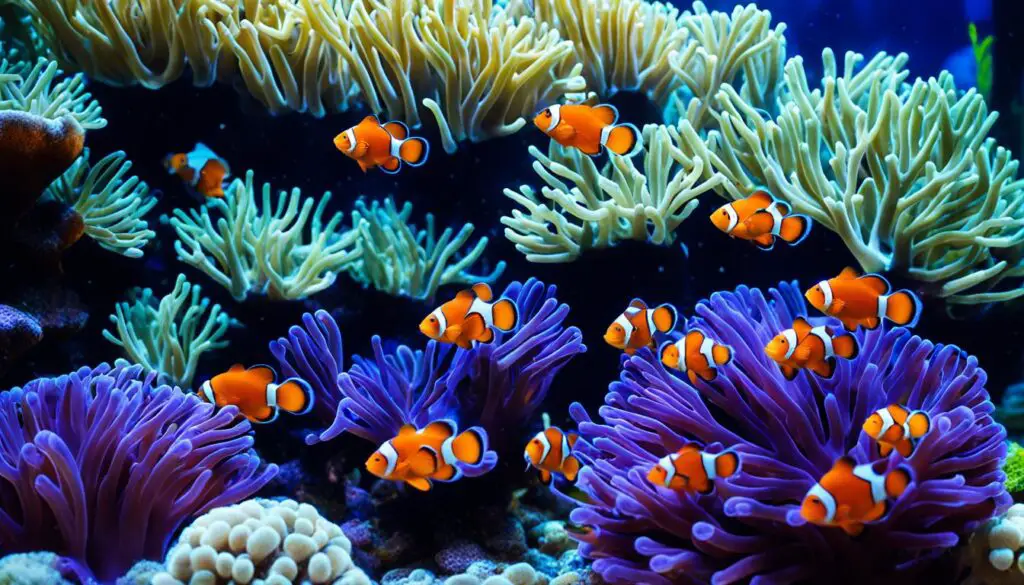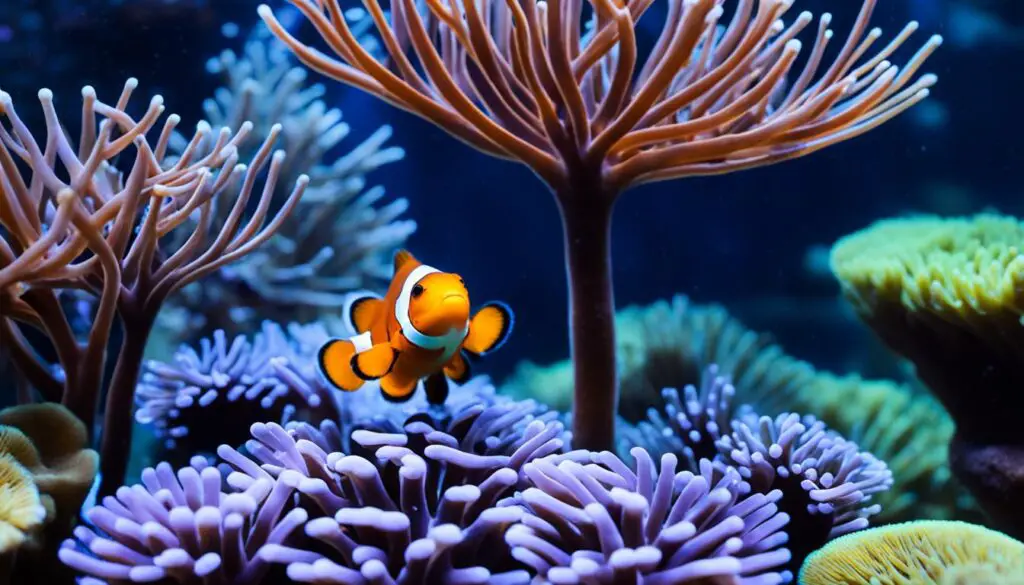Marine Life Preservation: Preserving Precious Treasures: The Importance of Marine Life Preservation!
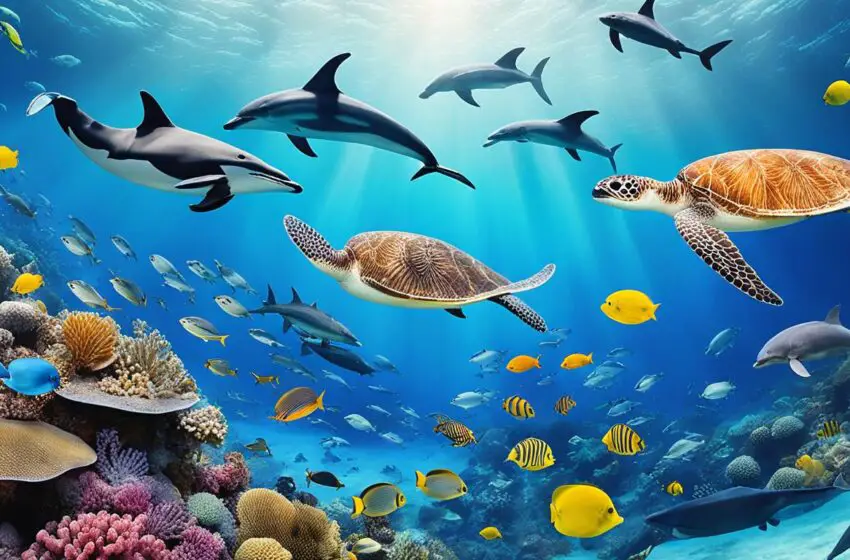
Hey there, readers! Today, let’s talk about something really important: marine life. Our oceans are bursting with different kinds of plants and animals. Saving these beautiful places is crucial for those who’ll come after us. We’ll see why it’s so vital to take care of marine life now.
Keeping the variety of ocean life is key. Overfishing, pollution, and climate changes are wrecking marine life. Many species might disappear, and the whole ocean world is at risk. The worst part is, ignoring this means harming our planet’s health too.
Key Takeaways:
- Marine life preservation is essential for maintaining the biodiversity of our oceans.
- The decline of marine life is caused by overfishing, pollution, and climate change.
- Protecting and preserving marine ecosystems is crucial for the survival of countless species.
- Preserving marine life ensures the delicate balance of life below the waves.
- We must act now to safeguard our oceans and the wonders they hold.
The Urgency of Marine Conservation
Our oceans face big problems today, like climate change, overfishing, and pollution. These issues destroy marine life and put the ocean’s balance at risk. The ocean’s ability to absorb carbon takes a hit, and its waters get more acidic, threatening many sea creatures.
With climate change’s effects growing, saving the ocean has never been more critical. It’s important to make marine sanctuaries to lessen these dangers. These safe places help sea life survive without the harm from humans.
Now, many countries, including the United States, are working on marine sanctuaries. These areas are meant to help marine life recover and grow. Protecting these spots gives our oceans a chance to recover and become stronger.
“The ocean is a central image. It is the symbolism of a great journey,” said Enya.
Marine sanctuaries are vital, from deep sea floors to colorful coral reefs. They offer a safe place for many sea animals and help ecosystems bounce back. By keeping people away, these areas let sea life do well and adapt. This is key for keeping our oceans healthy.
Sanctuaries also help us understand and fight climate change. They’re important places for scientists to research and figure out ways to help.
Creating these safe places is just one step. We also need to stop what’s harming the ocean. This includes fishing responsibly, using less plastic, and cutting down on pollution.
Everyone can help protect the ocean. By supporting projects that care for the sea and asking for more protected areas, we make a difference. Changing how we live can also help a lot. This way, we all work together to save our oceans for the future.
Let’s join our efforts to save the ocean’s future. By working together, we leave a lasting legacy of caring for the environment. This way, the ocean’s beauty and wonders stay around to awe and inspire.
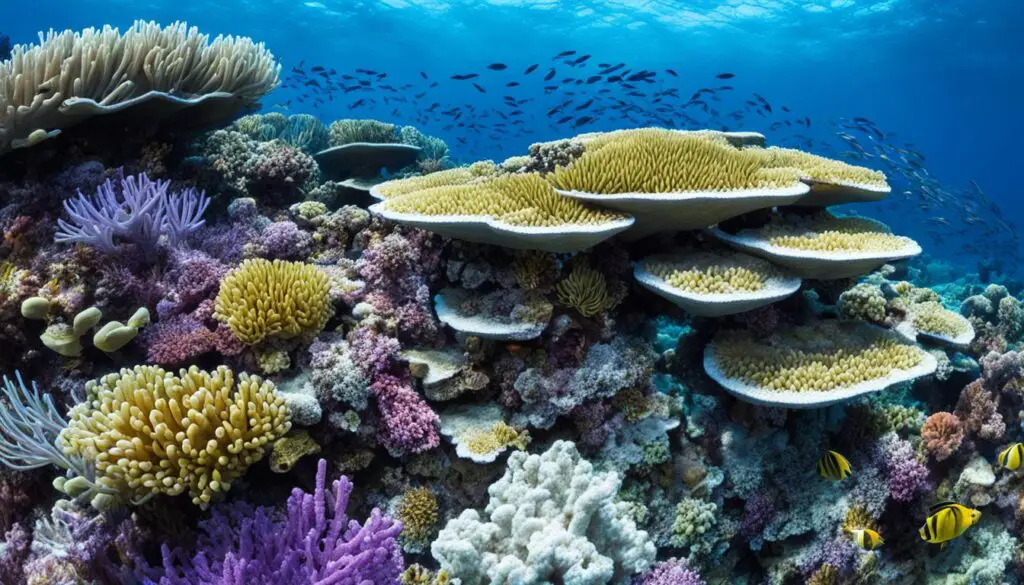
The Role of Divers in Marine Conservation
Divers are key in saving our oceans through careful diving and respectful habits. These steps help reduce harm to underwater life. They also protect marine ecosystems.
Being good at controlling your position in the water is crucial. This skill prevents harm to the sea’s fragile parts. Incredible care for sea creatures is a must. Divers must not touch them or disturb their homes. It’s also important not to take anything from the sea. When divers stay back and simply observe, they do their part in keeping the ocean’s variety safe.
Responsible divers select gear that’s kind to the environment, like safe sunblocks and cleaning items that don’t hurt the ocean. Such choices aid in saving our seas for the next generations.
Divers do more for the ocean by joining activities in marine conservation. For example, they might clean up trash during dives, helping keep the ocean healthy. They can also work on coral regrowth projects, adding homes for sea life. It’s also great to back groups like Project AWARE, which aim to teach about and save our oceans.
Teaching others about safe diving is also vital. By spreading what they know, divers encourage others to dive sensibly and care for the sea.
Benefits of Sustainable Diving Practices and Marine Conservation Initiatives
- Preserve the delicate balance of marine ecosystems
- Protect endangered species and promote biodiversity
- Contribute to the restoration and preservation of coral reefs
- Reduce marine pollution and preserve water quality
- Advocate for the long-term sustainability of the diving industry
| Marine Conservation Initiatives | Description |
|---|---|
| Clean-up dives | Organized dives focused on collecting marine debris and trash from the underwater environment. |
| Coral restoration projects | Efforts to rebuild damaged coral reefs and create habitats for marine life. |
| Supporting organizations like Project AWARE | Contributing to marine conservation and education through donations and volunteering. |
By using safe diving methods and joining in on clean-up and restoration projects, divers are powerful in saving our seas. Let’s all do our part to keep the magic of the ocean alive and well.
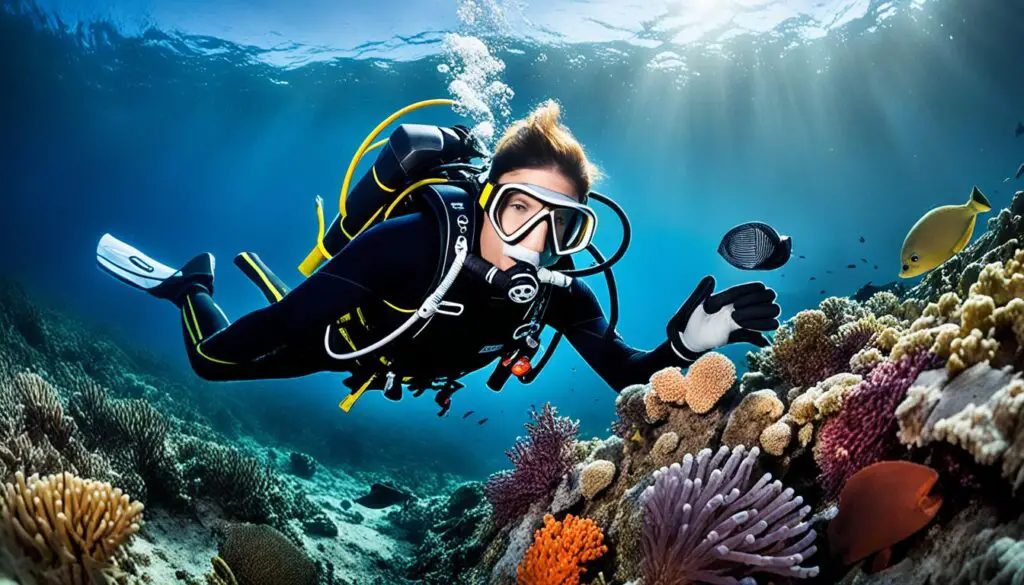
Conclusion
The diving community has a key role in marine conservation. They can help protect oceans by using sustainable diving practices. Also, diving with eco-friendly operations and joining conservation efforts makes a big difference.
Keeping marine ecosystems healthy is vital. It ensures our planet’s vital ecosystems thrive. Through environmental stewardship, we create a strong legacy of ocean care for the future.
Together, let’s aim to save our marine wonders. Using sustainable diving and smart decision-making aids marine conservation. This way, we ensure the ocean’s beauty stays for those to come.
FAQ
How does marine life preservation impact ocean biodiversity?
Marine life preservation is key to the health of the oceans. It protects various species, keeping the ocean’s balance. This ensures many creatures can continue living in their natural habitat.
What are the main threats to the oceans and marine life?
Climate change, overfishing, and pollution are big threats. They harm marine life and its habitat. The damage caused affects the entire ocean ecosystem.
How can marine sanctuaries and protected areas help restore ocean health?
Protected marine areas help fight climate change’s negative effects. They offer safe spots for marine life. This leads to healthier and more resilient oceans.
What role do divers play in marine conservation?
When divers use eco-friendly practices, they protect marine environments. This includes not disturbing marine life. They also use gear that’s safe for the environment.
How can divers actively participate in marine conservation initiatives?
They can join cleanup dives and help rebuild coral. They also support groups like Project AWARE. Their actions directly help keep the oceans clean and safe for all creatures.
How can the diving community contribute to marine conservation?
The diving community makes a difference by diving sustainably. They also back dive centers that care for the ocean. Plus, they take part in conservation projects. All these steps help protect marine life.
Why is marine conservation important?
It’s vital for the planet’s future. Protecting marine life means saving our most stunning ecosystems. Doing so ensures future generations get to enjoy the beauty of our oceans.

